ROBERT WILLIAMS BUCHANAN (1841 - 1901)
|
ROBERT WILLIAMS BUCHANAN (1841 - 1901) |
|
|
|
|
|
|
|
|
RANDOM LETTERS - continued |
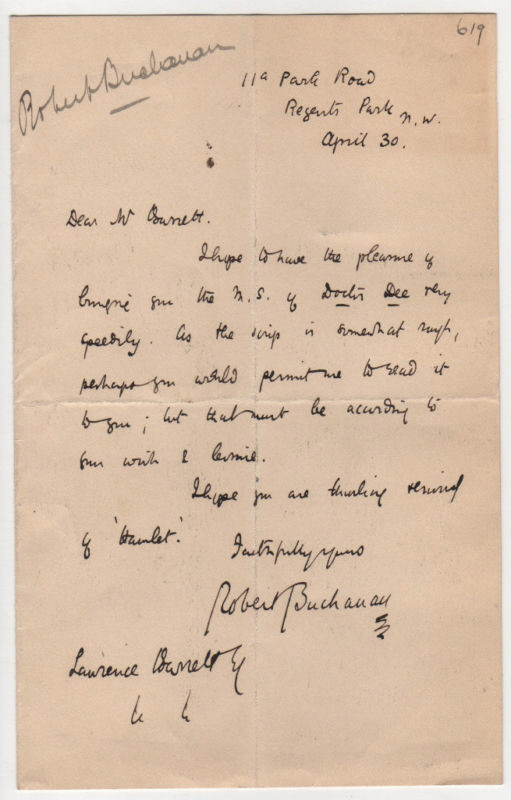 |
|||||||
|
To Lawrence Barrett - 30th April [1884]. 11a Park Road Dear Mr Barrett, I hope to have the pleasure of bringing you the M.S. of Doctor Dee very speedily. As the scrip is somewhat rough, perhaps you would permit me to read it to you; but that must be according to your wish & leisure. Faithfully yours Lawrence Barrett Esq
[Another letter from the David J. Holmes Autographs site, which suggests 1884 as the possible date. Lawrence Barrett was an American actor and according to the description of the letter: _____
To James Kennedy (New York) - June 1885. [A copy of this letter was kindly sent to me by James Kennedy’s great-granddaughter, Judy Denison. More information about James Kennedy is available here.] Westward Ho My dear Kennedy, I should indeed be churlish if I did not appreciate your fine lines on the unworthy theme of myself; they are as clever as they are complimentary, & you manage the Doric like a master. What specially endears them to me is the pleasure they gave to my dear mother, whose only fault is loving her son too much. I write this by the sickbed; for though she was well on my arrival & very happy in our re-union, she was yesterday taken suddenly ill with pneumonia, & for twenty four hours seemed at Death’s door. She is a little better now, & my poor heart is somewhat lighter. Unless God spares to me, I shall be a broken man; for since the earliest period of my remembrance, she has been the one sacred affection of my life. My days have been stormy & sad enough, & my fortunes often dire, but this one comfort has been left to me, & now it is all I ask. You may believe how cordially my heart goes to you, when I open it thus on a theme so sacred. I am grateful to you, my dear Kennedy, for your breezy sympathy & honest, simple, kindness, and shall ever be glad to hear from or of you. With even your reverence for literature & literary men I can sympathize, tho’ I cannot feel it; for in my eyes there is no thing under the sun worthy reverence save goodness & love – intellect is nothing – literature is nothing – save as they adumbrate what is diviner, & what the simplest nature may share with the highest. Intellect is like money – a minted coinage very useful for the affairs of this world – but compared with human sympathy, it is dirt & dross. But I need not say this to you, who have learned it long ago. When my mind is easier, & my heart less burthened, I will try to send you some books of mine which you may care to keep for my sake. I am glad you have been enjoying yourself with Charley Coote. He is a frank openhearted loveable fellow, honest to the core, with the rare quality of never pretending to any sentiment he does not feel; and he is clever, apt, & with insight, though not after the literary fashion. After all, is not the literary fashion a very poor one, compared with all the vital & strenuous fashions of life in general? But poetry in its essence is, as you rightly believe, the salt of the earth; not because of its literary quality, but because it sanctifies & spiritualizes the common dish of experience, & makes men love one another & believe in something higher than themselves. So highly does Providence value the mere gift of poetry, that she seldom supplements it with any other gifts; and indeed, it is all sufficient. Strife for Fame is another thing: an ignoble strife generally or very often. The poets God loves best are those man never crowns. Write to me as often you care to write; I shall always hear from you with pleasure, for believe me I am Always yours I am glad to hear that you were amused at Brooklyn. Of course the play is poor enough, but it serves its simple purpose. I think Coote’s performance most remarkable, & quite agree with you that he will make a great comedian if he perseveres. It was a good thing to have your kind face among the crowd, I am sure it brought us luck! |
|||||||
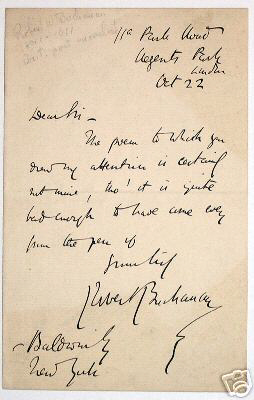 |
|||||||
|
To Mr. Baldwin (New York) - 22nd October [?]. 11a Park Road Dear Sir, The poem to which you drew my attention is certainly not mine, tho’ it is quite bad enough to have come even from the pen of Yours truly — Baldwin Esq.
[Another letter from the ‘11a Park Road’ address, so I’ve placed it here although I have no idea of the year it was written. Buchanan used rooms at 10a Park Road in 1872 (according to letters to Browning) and there are letters from 11a to Augustin Daly in July 1886 and to Edmund Gosse and Marie Corelli in February 1887.] |
|||||||
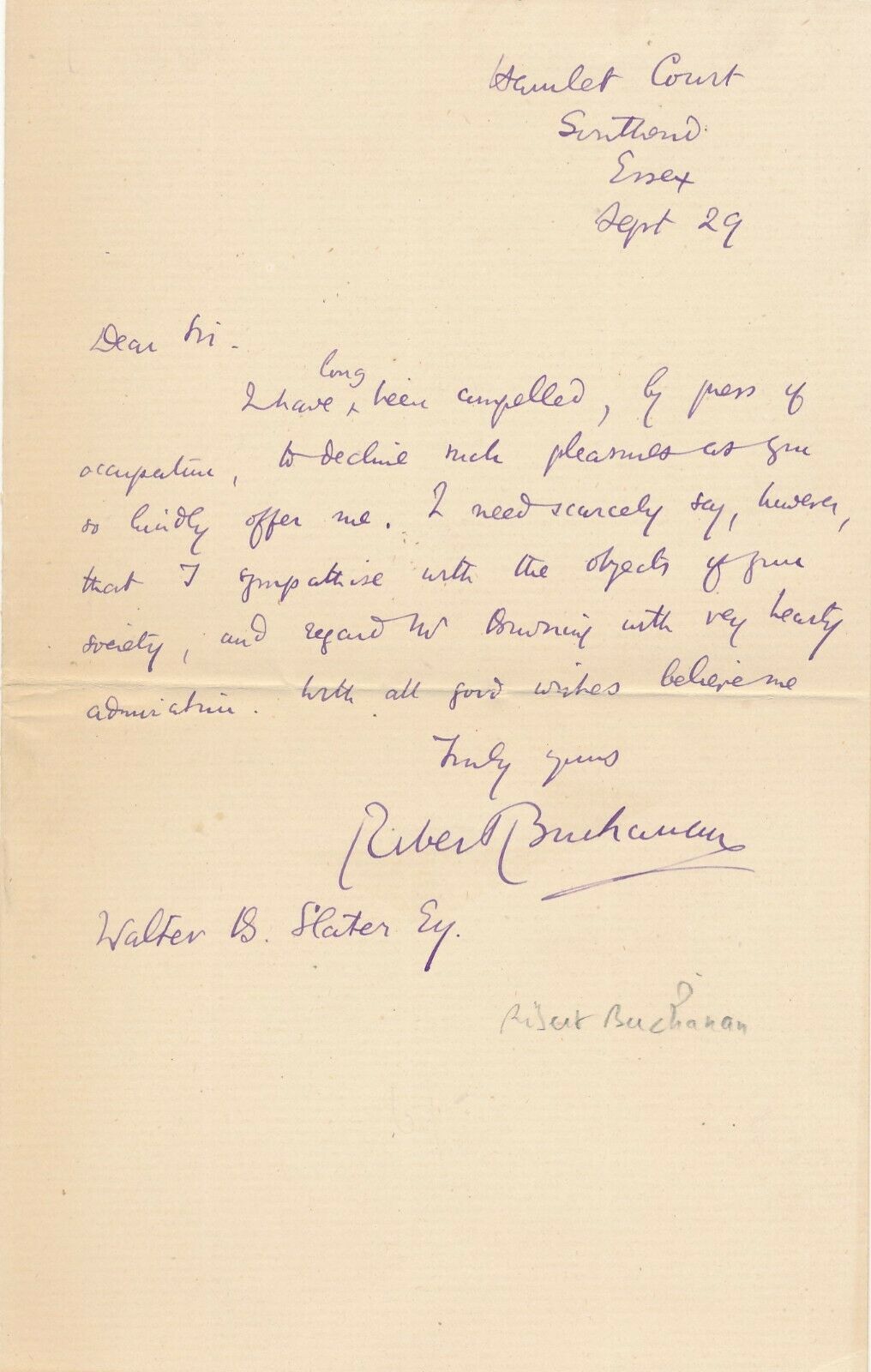 |
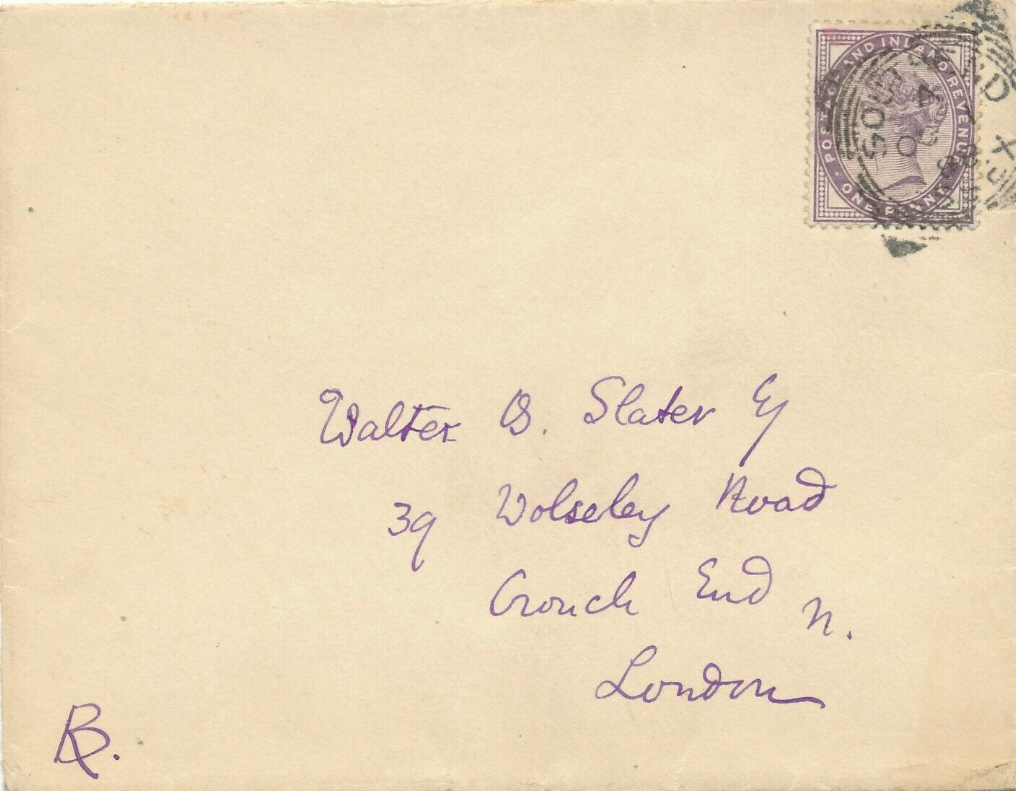 |
|
To Walter B. Slater - 29th September [1888]. Hamlet Court Dear Sir, I have long been compelled, by press of occupation, to decline such pleasures as you so kindly offer me. I need scarcely say, however, that I sympathise with the objects of your society, and regard Mr Browning with very hearty admiration. With all good wishes believe me Truly yours Walter B. Slater Esq.
[Buchanan lived at Hamlet Court from 1887 to 1889 (according to surviving correspondence) but the postmark on the envelope would seem to indicate the letter was posted in October, 1888. “Mr. Walter Slater’s books and manuscripts include a unique series of both Dante G. Rossetti and Walter Savage Landor. Of the former, it contains the manuscript of three-fourths of the ‘House of Life’ series of sonnets, the manuscript of ‘St. Agnes,’ and the whole of the extant manuscript of ‘The King’s Tragedy’; these manuscripts usually include not only the ‘copy’ as it was sent to the printer, but usually the first and second drafts. The series of Landor books and pamphlets is quite complete, from his first book of poems, ‘Moral Epistles,’ issued in 1795, and the equally excessively rare ‘Poems from the Arabic and Persian,’ issued at Warwick in 1800, to ‘Savonarola,’ in Italian, 1860. Mr. Slater has a complete series of the first editions of the curious works of Mrs. Behn.”] |
||||||||||
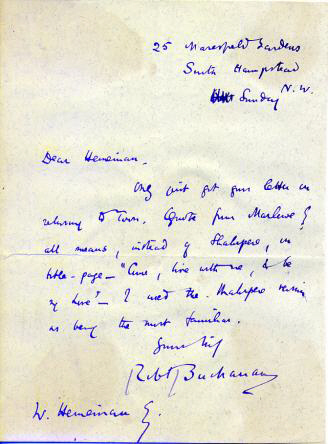 |
||||||||||
|
To William Heinemann - [1892]. 25 Maresfield Gardens Dear Heineman, Only just got your letter on returning to Town. Quote from Marlowe by all means. Instead of Shakspere, on title-page—”Come, live with me, & be my Love”—I used the Shakespere version as being the most familiar. Yours truly W. Heineman Esq.
[This could be from 1891. There is some confusion about when Heinemann published Buchanan’s novel, Come Live with Me and Be My Love. The British Library lists a 2 volume edition as published in 1891, but the only reviews I’ve found are for the one volume edition published in the summer of 1892.] |
||||||||||
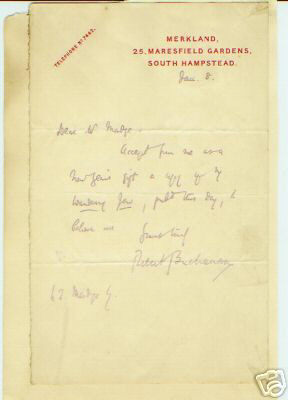 |
||||||||||
|
To Mr. Madge - 8th January [1893]. TELEPHONE No 7442 MERKLAND, Dear Mr Madge, Accept from me as a New Year’s gift a copy of my Wandering Jew, pubd this day, & believe me Yours truly W T Madge Esq.
[W. T. Madge was the manager of The Globe, the London evening newspaper.] |
||||||||||
 |
||||||||||
|
To Mr James G. [?] - 21 January [1898] 55 Christchurch Road Dear Sir, I note the following in No. 138 of your catalogues. 88. Nisbet Where Art begins 3/6 261. Life of an Actor. By Pierce Egan - 8/6 331. Boccaccio’s Decameron 4 vols 10/ If they are still unsold, or any of them, please forward with invoice & I will send you the cash. Truly yours Mr James G. [?] Any other catalogues will be acceptable.
[There are several letters from this address to Leonard Smithers during March and April 1898, so I’m fairly certain this letter is from that year. The books Buchanan ordered are: Where Art Begins by James Hume Nisbet (8 August 1849 - 4 June 1923). Hume Nisbet provided some of the illustrations for The Outcast. The Life of an Actor by Pierce Egan. The Decameron by Giovanni Boccaccio.] |
||||||||||
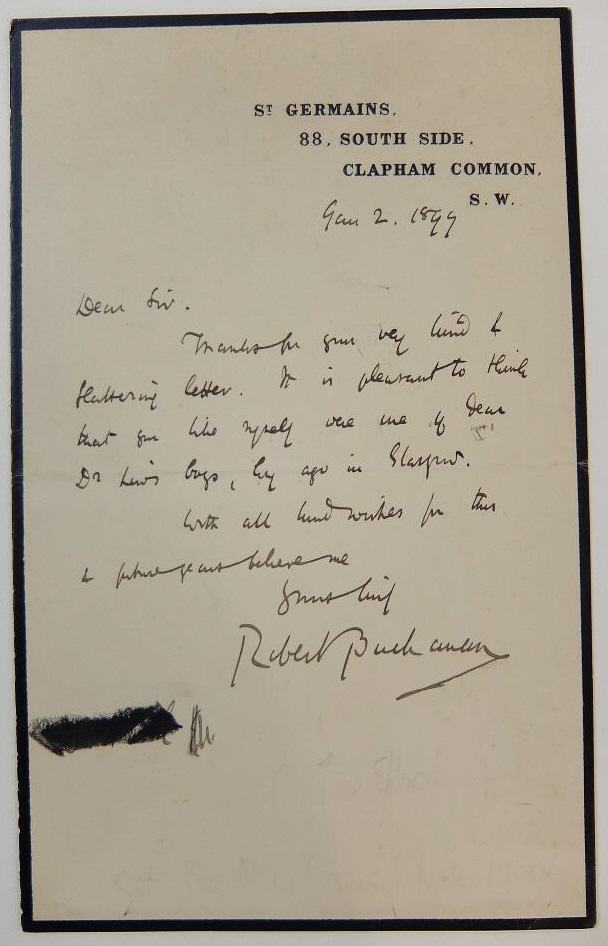 |
||||||||||
|
To unknown recipient - 2nd January, 1899. ST GERMAINS, Dear Sir, Thanks for your very kind & flattering letter. It is pleasant to think that you like myself were one of dear Dr Lowe’s boys, long ago in Glasgow. Yours truly
[According to Chapter III of Harriett Jay’s biography: “By this time Mr. Buchanan [Snr] was a fairly prosperous newspaper proprietor, owning besides the Sentinel two other newspapers which he had started, the Glasgow Times and the Penny Post. He had taken a flat in the West end of Glasgow, close to the Park, and there, when his son left Rothesay, he resided with his parents. His first day-school was the Glasgow Academy, where he attended the Latin classes of Doctor Corrie. From the Academy he passed on to the High School, attending the French and English classes under teachers whose names I have heard but forget, and the Latin classes under Doctor Lowe, whom he ever remembered as the kindest of schoolmasters and who first instructed him in the mysteries of the manufacture of Latin verse.” ] |
||||||||||
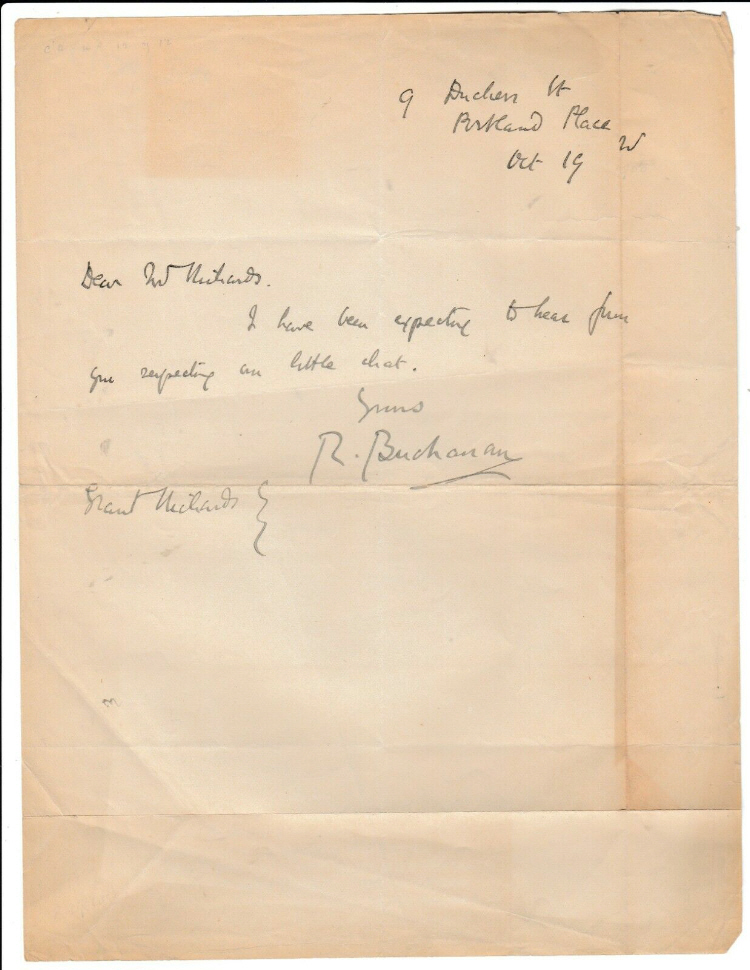 |
|
To Grant Richards - 19th October [1900]. 9 Duchess St Dear Mr Richards, I have been expecting to hear from you respecting our little chat. Yours Grant Richards Esq.
[This letter (more of a note) turned up on ebay at the end of September, 2021. At first sight it appears rather inconsequential but its significance lies in the date. Although there is no year, the address confirms it as 1900, since, as Harriett Jay states in her biography of Robert Buchanan: ‘We arrived at the rooms in Duchess Street on Monday, October 8, 1900, and all those friends who saw him at that time were amazed at the wonderful improvement in his health, for his old gaiety of spirit seemed to have come back to stay.’ And she continues: ‘His interest in his work was keener than it had been for years, and he was never tired of talking over future plans. Although we had taken rooms in the busiest part of London he continued his cycling as before, going about among the traffic with an intrepidity which filled me with terror. On Wednesday, October 17th, he went to the Avenue Theatre, saw and greatly enjoyed the performance of “A Messenger from Mars.” On the Thursday morning he interviewed several people on business, and got a little excited in conversation, and just before dinner, when we were again alone, he took up the evening paper, and after looking at it for a few minutes put it down again, saying he could not see very well. I thought he must have tired himself and persuaded him to cease 312 reading till after dinner. The symptom passed away and he thought no more of it. So, this letter to Grant Richards is one of the half dozen letters Robert Buchanan wrote just before suffering the massive stroke from which he never recovered. There is another letter (to the editor of The Star), presumably from the same batch, in the Charles E. Young Research Library at UCLA, which is available on this site. It does seem strange to me that, considering how many of Buchanan’s letter have been lost, two have survived from the final half-dozen. As for this one and the possible subject for Buchanan’s ‘little chat’ with Grant Richards, there may be a clue in the following description of a letter in the Mortlake Collection of Pennsylvania State University: “ALS, 27 September 1900, to publisher Grant Richards, about three books, Latterday Letters, Recollections, and The Coming Terror.” Judging by the first two titles this was probably an attempt by Buchanan to interest Richards in publishing his autobiography, which had been rumoured to exist since 1884. _____
DESCRIPTIONS OF OTHER LETTERS The following are descriptions of letters from various sites - autograph dealers, abebooks.com etc. Without seeing scans of the letters one has to take the descriptions at face value and assume that the attribution to Robert Buchanan is correct. 1. ALS, 2pp, 8vo, 102 Prince of Wales Road, Haverstock[?] Hill, N.W., date unclear. To editor [William] Hepworth Dixon, hoping to arrange a time to meet, acknowledging receipt of a letter, and remarking: “I did not guess that you wrote the notice, but I am much pleased to hear that you did so. . . .” Some soiling and toning; center fold just barely starting; else good. Item # 20048 $75.00. 2. ALS, 2pp, 8vo, Grove Cottage, Haverstock Grove, 9 February 1864. To J.A. Langford, the Birmingham antiquary and journalist: "Pray do not put yourself to any inconvenience concerning the Lecture. I have by no means decided to read in Birmingham, tho' I thought such a contingency was possible.'' Buchanan says that he won't be able to do anything until next winter, and thanks Langford for his recent book of poems ("I shall read them leisurely.''). A little soiled and worn; traces of paper tape on verso, but in good condition. In 1864, as in 1859, Langford published a volume of commemorative poems on Shakespeare. Item # 2255 $135.00. In December 2010 this letter was offered for sale on ebay accompanied by a photograph of the second page: |
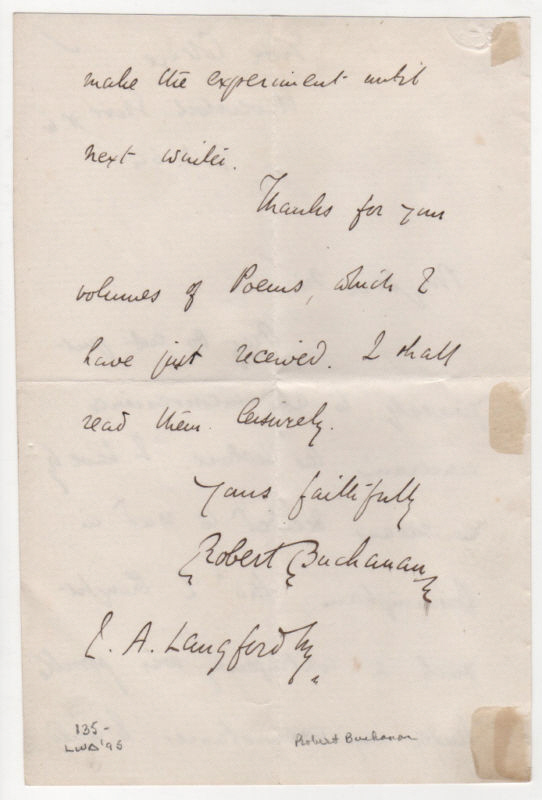 |
|
3. ALS, one page, 8vo, Etretat, Seine Inferenie, France, 19 January 1866. To W.C. Bennett, writing: "Your volume reached me in a roundabout way, but I have been unable to thank you for your kindness. I have read a portion of the poems, & with much pleasure, & I thank you heartily.....'' A little worn, but in good condition. W.C. Bennett is William Cox Bennett, a minor poet who published several volumes of verse [see NCBEL III, 507-8]. Item # 4160 $125.00. [see above] 4. ALS, one page, 8vo, on pale blue mourning paper, Belle Hill, Bexhill[?], 16 April 1866. To the Dalziel Brothers, accepting their terms for "the set of poems illustrated by Pinwell. . . . I reserve the right of incorporating the poems in my collected works, but not within three years. Will you kindly let me know how many more photographs there will be. . . ." Rather foxed, with a red, crested six pence postal stamp embossed at top; else good. Annotated in red in beneath the return address: "Wayside Posies [date crossed through]." Item # 17903 $175.00. [see above] 5. ALS, one page, 8vo, 11a Park Road, Regents Park N.W., April 30, n.y. To the American actor, Lawrence Barrett: "I hope to have the pleasure of bringing you the M.S. of Doctor Dee very speedily. As the scrip is somewhat rough, perhaps you would permit me to read it to you, but that must be according to your wish & leisure. I hope you are thinking seriously of Hamlet.'' Verso of integral leaf slightly torn (removed from an album); slightly soiled, but in very good condition. This letter probably dates from the spring of 1884 when Barrett took over the management of the Lyceum Theatre in London, during its owner, Henry Irving's first visit to the United States. DAB notes that although Barrett's "engagement there was productive of no financial success, he was received cordially in professional and artistic circles, and was the recipient of many social attentions, including a banquet given in his honor.'' Item # 6187 $125.00. [see above] 6. ALS, 2pp, small 4to, St. Germains, 88 South Side, Clapham Park, 11 December, n.y. To Alfred E. Knight, Esq., thanking him for his kind letter of support, and writing: "Pray, pray, don't fancy that I pose as a badly used & misunderstood person. A man cannot take the losing side in most questions . . . nor can he criticize men & things honestly without paying the piper. . . . I get as good as I give, and if I am boycotted (which is true enough) what does it matter?. . . . As to the financial question, that's different. I have always warned young men . . . as I was warned many years ago by dear old Barry Cornwall. If I had started out with the most modest independence . . . from other sources than literature, all my life would have been different. . . . I have had to part with my work for a beggar's wage. On the other hand, I have been both careless & extravagent, & much of my worry has been of my own making. . . ." Small staple or pin hole at upper left; some light foxing and soiling (mostly stains from prior mounting); else good. Item # 17724 $350.00. 7. ALS (with an additionally initialled post script), 2 1/4pp, 8vo, 17 Cavendish Place, W., 25 May, n.y. To Evelyn Ballantyne, apparently in defense of literary criticism attributed to Buchanan: "I am very sorry if I have been unjust to Mr. James, though I cannot honestly say that I feel myself to have been so. . . . I do not . . . feel so bitterly towards [Mr. Moore] as you do, for he has amused me very much. . . . Whether or not I am a successful writer, is really of no consequence to any one but myself, -- and 'success' is a word which needs definition. . . . If it means 'to be praised and belauded,' I am the . . . failure of my generation. If it means to make those who hate me listen to me, & perhaps be a little afraid of me, I have been being successful. . . . I have some Irish blood in my veins, & rather like a shindy . . . for the love of the thing, but as for hating any one, even the man who hits me on the head from behind, why, that's beyond me!" Lightly foxed and soiled; starting at folds; good. Item # 17896 $225.00. * ‘Autograph letter signed, 4 pp., 8vo; undated, but marked “rec’d Feb. 7, 1860,” to William Makepeace Thackeray. Preserved in the original orange printed filing folder of the Cornhill Magazine (“Publication Department”). A charming and quintessentially youthful appeal from Buchanan, then an aspiring young writer of 18, to Thackeray, the great man of letters aged 48. No doubt this letter, or some version of it, has been written many times, in many places, by many aspiring writers of tender years: “Sir, Do not throw this letter aside; but take it up, think over it, and read it thro’ — as a man, not an editor. I demand this in the first place; because, if you only glance over it, the suit it propounds is hopeless. — I shall be as brief as possible, for both our sakes. I am led to hope that your new periodical is not exclusively devoted to papers by men of established reputation — that, on the contrary, merit coming from any quarter may seek & find a place in it. Your Prospectus, your general works, and your latest papers, endorsed this hope. Was it a correct one? If so, you will read my poor little M.S. Some time ago I forwarded to Mr. G. H. Lewes a portion of a contemplated work, poetical of course, but of a peculiar character. His reply came thus: “Publish a volume of such poems, & you will make a position for yourself.” He advised me, however, to wait for a short space of time, in order to perfect my materials &c. and, of course, I determined to follow his advice — wise advice. Now, my object in writing to you must be plainly stated — I shall not aid my cause by rigmarole. I say plainly, then, that the publication of either of the two enclosed poems in your Magazine would do my projected adventure more good than you can ever be aware of. I am a very young man (not quite nineteen) and ask you to give me a chance of making a respectable appearance. I need not appeal to your generosity — I believe that it is too well tested. If you regard the poems as worthy, print them; if they [are] not up to the mark, burn them. But do me justice, in spite of established reputation. Excuse my freedom in addressing you so familiarly. Believe me, you have not a warmer admirer in all Britain than the poor devil of a poet who subscribes himself, Sir, yours most respectfully, Robt. W. Buchanan.” In fact Thackeray seems to have taken no notice; a note on the front of the Cornhill Magazine folder here seems to indicate that Buchanan’s letter was answered only after more than three months, and then by a “Mr. Williams.” But Buchanan was not deterred, and later in the year he came to London to launch his “brilliant career.” He sought out G. H. Lewes in person, and George Eliot as well, along with Browning, Peacock, and Dickens (who accepted several contributions for All the Year Round). In time Buchanan successfully established himself as a poet, though unhappily his reputation now rests mainly upon his controversial attack on the pre-Raphaelites, The Fleshly School of Poetry, first published in 1871. It is perhaps worth adding that Buchanan did not in fact follow the suggestion of Lewes which he reports to Thackeray, but went ahead and impatiently published a first book in Glasgow, entitled Poems and Love Lyrics. This volume is undated, but clearly pre-dates Buchanan’s departure for London in 1860; curiously, the book is not listed by either the DNB or CBEL, and is wrongly described in the NUC (IU, CSmH) as having been published in the 1870's. Price: £900.’
On 29th March, 2011, this letter was sold for £600 at an auction at Bonhams of New Bond Street, London. Their description of the letter is as follows: Lot No: 29 BUCHANAN, ROBERT WILLIAMS (1841-1901, poet and novelist) EARLY AUTOGRAPH LETTER SIGNED (‘Robt. W Buchanan’), to W.M. THACKERAY, writing when eighteen years of age, forthrightly urging Thackeray to read and then publish two poems in The Cornhill Magazine (‘Do not throw this letter aside; but take it up, think over it, and read it thro’ - as a man, not an editor. I demand this in the first place: because, if you only glance over it, the suit it propounds is hopeless...’), expressing the hope that The Cornhill is not devoted only to the work of those of established reputation (‘...if so, you will read my poor little M.S....’), telling him about the opinion and advice he received from G.H. Lewis after he had forwarded a portion of a contemplated work (“Publish a volume of such poems, & you will make a position for yourself”), stating his present purpose plainly and without ‘rigmarole’ (‘...the publication of either of the two enclosed poems in your Magazine would do my projected adventure more good than you can ever be aware...’), appealing to his generosity, asking pardon for his own familiarity, stating his admiration for Thackeray (‘...you have not a warmer admirer in Britain...’), and suggesting that he burn the poems if they are not up to the mark, 4 pages, octavo, tipped onto a Cornhill Magazine publication department filing orange paper folder with the Magazine number CCCCXXIV, receipt note at head (7 February 1860), 9 Oakfield Terrace, Hillhead, Glasgow, undated but noted on the folder that the letter was answered on 17 May 1860. Sold for £600 inclusive of Buyer’s Premium. Footnote: Thackeray did not answer the letter himself; that was left to Mr Williams, and he took three months to do so.
And I then came across another mention of the letter in the British Library manuscripts catalogue, where a copy of the letter has been deposited in the ‘Copies of Exported Manuscripts Deposited under Government Export Regulations’ section, indicating that the original has been bought by a foreign buyer. * 1. Autograph Letter Signed to “J. Maclehose”, publisher. 2. Autograph Letter Signed (‘Robt Buchanan) to George Manville Fenn (1831-1909). [Since the letter shares the ‘Larkhill’ Rise address with the George Canninge letter above, I should think the play referred to is The Nine Days’ Queen, which was premiered at a matinée at the Gaiety Theatre on Wednesday, December 22nd, 1880, starring Harriett Jay. George Manville Fenn was a prolific writer of adventure stories for boys, but was also the editor of Once A Week from 1873 to 1879.] 3. Autograph Letter Signed (‘Robt Buchanan’) to Harold Kyrle Bellew (1855-1911) 4. Autograph Letter Signed ('Robt Buchanan') from the poet and novelist Robert Buchanan to the autograph hunter John T. Baron of Blackburn, discussing the publication of his work. * Lists a third edition of Saint Abe and His Seven Wives (1872): “Tipped in is an ALS from Buchanan to Hepworth Dixon, 2pp. "Belle Hill, Bexhill near Hasting, Aug. 9th, " asking him to review a new edition of "Undertones" requesting "could you give it a line or two? or quote some of the new matter—say verses 19-20-21-22 of the Prologue". $137.35. * Autograph Letter Signed to P.W. Bunting, sending him a book, 1 page 8vo on black-edged stationery, Cavendish Square, 10 Dec no year. [No: 3174] £32. _____
|
|
|
|
|
|
|